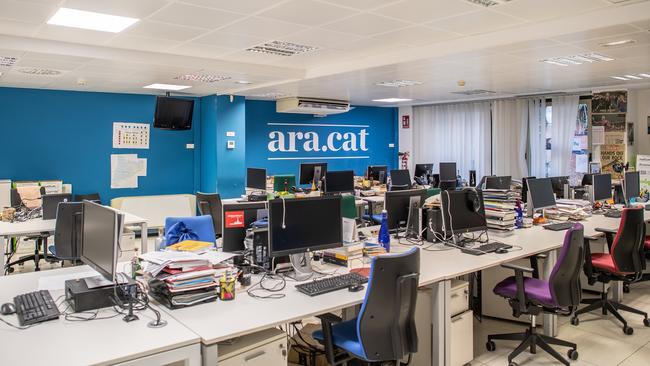David Penberthy: Coronavirus could change the nature of work forever
With thousands of Australians working from home on account of coronavirus, the way in which businesses has changed. But what does it mean for the future, asks David Penberthy.
Rendezview
Don't miss out on the headlines from Rendezview. Followed categories will be added to My News.
A great mate of mine is an unbreakable workplace cynic.
The People and Culture department could take him to the HR equivalent of Camp X-Ray and waterboard him for days, and he would admirably still refuse to abandon his unyielding hostility to team-building exercises, group planning days, any form of workplace engagement that goes beyond the core business of just doing his job.
A couple of years ago when presented with one of those interminable staff satisfaction surveys, where you could answer “strongly agree” or “strongly disagree” on a scale of 1 to 10, he spent several seconds giving every question a 5 for satisfactory, and for his piece de resistance, wrote this solitary killer sentence in the general feedback section:
“I prefer to be left alone.”
Many thousands of working Australians are now completely alone, but still working, on account of the coronavirus pandemic. And when all this blows over – we should keep reminding ourselves that it will – the nature of work could change forever.
I am talking here about office work, and do so mindful of the much more real and tragic loss of jobs occurring in so many sectors.
As the world grapples with a horrible real-time science experiment, a corresponding workplace experiment is being born out of necessity.

While the variables of this experiment will be clouded by the economic impact of the pandemic, it will provide workable insights into the levels of productivity than can be achieved by working from home.
This pandemic will change the way we work for two reasons – one, because it will deliver some benefits, and two, because so many companies will be so short of cash they will be desperate to find new, cheaper ways of operating.
My hunch is that in the post-corona world, workplaces will ask themselves why they have been spending money for years on big city rents or huge capital works investments in buildings of their own, millions of dollars on office furniture, carpet, lights, tea rooms, fridges, toilets, showers, whopping great power bills and expensive public liability insurance lest some random punter slip over on the freshly-mopped foyer floor.
The nature of meetings will also change. Bring it on. I can almost get clinically depressed thinking about how many hours of my life I’ve spent sitting in meetings and what I could do with that time.
In the four-odd years I spent editing newspapers, when I worked from 9.30am until 9.30pm (on a good day), it was common for six or seven hours of the workday to be consumed by meetings. The worst were the WIPs, work-in-progress, which often involved a recap on what had been discussed the week before, discussion around “action items” for this week, and then a bit of a look-forward to what would be discussed in a week’s time.
I am certainly not knocking any of the talented and likeable people who were in these meetings, it’s just that as a collective we often seemed to achieve about four-fifths of you-know-what, in a setting which always arbitrarily had to go for one hour.

The phenomenon is not confined to any one industry. The best meetings were the quick urgent ones, in small groups or pairs, where you identified and fixed a problem or came up with a plan to seize an opportunity. The others? Far out, we could probably find a cure for the coronavirus if we all had that time again.
For the past few years I have been working half in an office and half at home. My daily routine involves waking up at stupid o-clock to do breakfast radio at our city studio, with a few meetings with the boss and the marketing people after, and the occasional pleasant coffee or lunch with clients during the day, but all my newspaper work and preparation for the next day’s radio is done from my study at home in the arvos and evenings.
As such, the impact of the virus, which has forced a near total clear-out of our radio headquarters, has not felt that different to me.
I have found working from home to be terrifically productive compared to the meeting-driven workday I used to endure, where it felt like the creative stuff had to be furtively snuck in between the mandated drudgery.
Another weird thing – you save a couple of grand a year on clothes. You don’t want to know what I’m wearing while I write this column but it ain’t a suit, an item that’s now reserved only for rare work-related occasions.

I read a terrific study this week online from the business website inc.com about a two-year Stanford University study into a business called Ctrip, China’s largest travel agency. The company has 16,000 employees and its CEO wanted to give staff the work-from-home option because office space in the company’s Shanghai HQ is punishingly expensive and employees had to endure long trips to work because they couldn’t afford to live in the city. The result was a spiralling rate of attrition.
Stanford designed a test whereby 500 employees were divided into two groups – a control group who continued working at HQ, and volunteer work-from-homers, who had to have a private room at home, at least six-month tenure with the company, and decent broadband access as conditions.
The study showed an “astounding” productivity boost among the home workers, equivalent to a full day’s work each week. They were never late, didn’t have to leave early for personal reasons, found it less distracting and easier to concentrate.
They took shorter breaks, had fewer sick days, took less time off, and their attrition rate fell by 50 per cent. The company saved almost $2000 per employee on rent by reducing the amount of HQ office space.
The one big downside was that more than half the at-home staff said they felt lonely and isolated from their colleagues – a problem that could be easily fixed through the use of rentable short-term spaces for larger catch-ups, or coffee shops or pubs for small get-togethers.
Who knows? It might even make my cynical mate look forward to the annual planning day. The current, life-altering madness means anything is possible.

